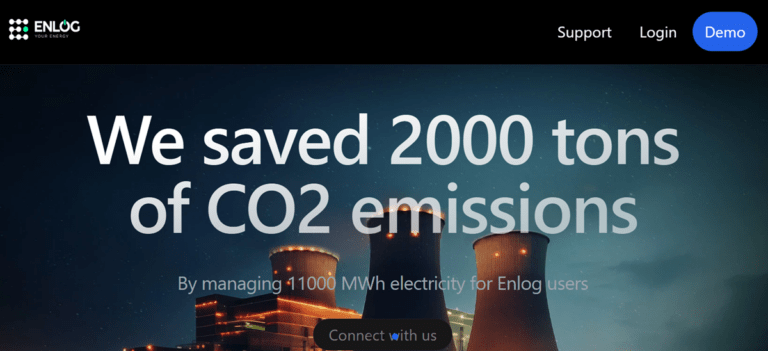After working for years in companies like Google, Mercedes-Benz R&D, and Ford in network analytics and product development, Bharath decided to do something that he longed for since his university days. Thus, he founded Enlog in 2019 and successfully reduced energy consumption by 23% through various implementations.
| Startup Name | Enlog (previously EPVI) |
| Founders | Bharath Rankawat and Jharna Saha |
| Industry | Climate Technology Product Manufacturing |
| Company Classification | Private Limited |
| Headquarters/based-in | Gurugram, Haryana, India |
| Idea | To make energy optimization easier for everyone irrespective of their non-technical background. |
| Revenue | FY23 Rs 17 lakh
FY24 Rs 2.3 crore. |
| Date of Commencement | 2019 |
| Investments | Bootstrapped with Rs 45-50 lakh.
Raised Rs 2.75 crore from Vinners Group and Elina Investments (making company value Rs 40 crore). Another investor round is in talks. |
| Number of Employees | 36 |
Competitors: EcoEnergy, Sense, Tendril, and Wattson.
The Problem: Why Does This Matter?
With growing industries and urbanization, there is a rise in global energy demands which further intensifies the pressure on resources.
According to the 2022 International Energy Agency report, there is an expected 40% rise in global electricity demand by 2040. The main reasons are population growth, economic expansion, and electrification of transport and manufacturing sectors.
Little-known fact: According to the IEA 2023 report, Indian households, businesses, and hotels lose around 20% of electricity through unattended appliances, inadequate energy management systems, and outdated equipment.
People are unaware of how much power they are wasting when an appliance is left running, unnecessarily.
The Solution: Enlog

To cater to the problem, Bharath Rankawat and Jharna Saha founded Enlog in 2019. It is an AI-powered energy management and Internet of Things (IoT) solutions.
The Delhi-based startup was bootstrapped with Rs 40 to Rs 45 lakh by his personal investment.
This platform reduces energy waste and optimizes electricity consumption. Moreover, they promote sustainability across different sectors. The passion for saving energy was developed in Bharath’s mind while he was pursuing a BTech from Kurukshetra University.
The company was initially launched in 2017 as EPVI with a focus on lighting. They also produced AutoSwitcher lighting products and sold 3k+ units.
In 2019, EPVI transformed into Enlog, shifting its aim to providing IoT-based energy management solutions.
Extensive market research done in 2019 included monitoring energy consumption patterns of 1000+ houses, factories, and hotels. It revealed that there is a significant gap in energy management, specifically in small businesses and households. In simple terms, they were unaware that energy is actually being wasted through certain activities.
As a result, in 2020, he developed Smi-Fi. It is an IoT-based energy-saving device. Moreover, in 2020, Jharna Saha also joined Bharath in his mission. Jharna is a marketing specialist and with experience in UI/UX and brand building, she redesigned the app.
Then, in 2021, the Enlog app was launched providing real-time monitoring of energy usage to its users.
- Through a cloud-based platform, we can monitor consumption, and potential savings, and enable proactive energy management.
- There are various energy-saving modes to choose from. It helps in balancing comfort and efficiency.
- Through autonomous management of HVAC systems by Smi-Fi, energy savings became easier.
Business Model: How Do They Make Money?
Enlog’s primary strategy is to deal with B2B customers.
- In FY23, Enlog generated Rs 17 lakh in revenue.
- In FY24, revenue generated was Rs 2.3 crore.
- In FY25, the projected revenue is Rs 12-13 crore
The cost of Smi-Fi devices is from Rs 1000 to Rs 1 lakh. The price depends on the requirements of the clients and the size of the device they purchase.
More than 15,000 users claim to have saved more than 11,300 MWh of electricity and reduced more than 2,000 tonnes of carbon emissions.
- Enlgo has expanded its operations in metro cities like Hyderababd, Pune, Mumbai, and Bengaluru.
- In Delhi-NCR, it has partnered with more than 750 hostels & PGs, and 35 hotels.
- It has also partnered with brand hotels like Bloom Hotel.
- Enlog’s pilot projects are running with Lemon Tree and Holiday Inn.
By 2027, Enlog aims to reduce an additional 1 million tonnes of carbon emissions.
Challenges/Struggles: What Roadblocks Are They Facing?
Smi-Fi app connects IoT devices to our existing electrical systems, thus, monitoring real-time consumption becomes easier. It collects data on: consumption patterns, environmental conditions, and appliance behaviors.
Result: identification of a 2-fold problem.
- Consumers were often unaware of their energy-wasting patterns.
- Available solutions on the market were too costly or complex for the customer to handle.
People are uneducated in this regard and pay the least attention towards this matter. Thus, the startup is partnering with schools and local societies. Together they are arranging sessions where they spread awareness about energy-wasting activities. Also, they share ways to be more energy-efficient in our daily lives.

Future Vision: What’s Next?
To educate people about energy-saving practices, Enlog is collaborating with schools and residential societies.
Least-known fact: As per research in 2023, the Indian energy management systems market’s generated revenue was USD 2,064.9 million. This, by 2030, is expected to reach up to USD 6,868.5 million.
With that prospect, Enlog aims to triple its revenue by FY25 to Rs 40-45 crore.
Moreover, the startup is planning to expand to international markets where energy efficiency is a major rising concern: the Middle East and Europe. Also, the products will be listed on major online marketplaces like Flipkart and Amazon.
Now, Enlog focuses on prioritizing R&D as it moves from external servers to edge computing. Through this, they will create their own System on Chips (SoCs). It will seamlessly integrate communication protocols and data from electrical channels.
Key Takeaways: Why Should Users Care?
Through this story, we should learn how to take action at the right time. Market trends are important and should not be neglected. This fact is applicable to all types of businesses.
Just as following the research and development route, Bharath is growing his business, the same can be followed by us too. The correct growth strategy is a core element of any business plan.




